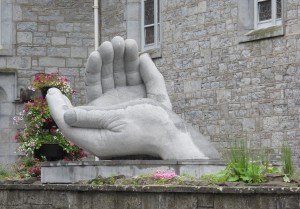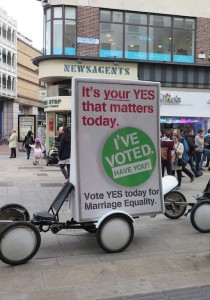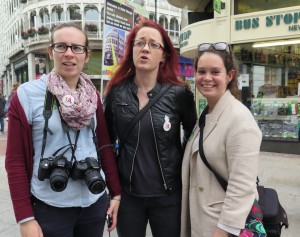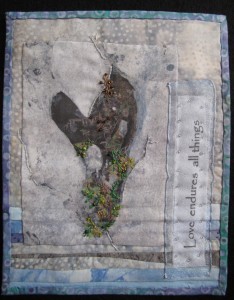 On 22 May, my husband and I said good-bye to our temporary home in Tramore and drove to Dublin, where we spent the night before taking the hovercraft to Wales the following day. We dropped our bags at the B and B and walked into the city center because May 22 also happened to be the day on which Ireland was voting on a referendum concerning marriage equality – a referendum that, if passed, would legalize same-gender marriage. We were eager to see what might be happening in the way of demonstrations (nothing) and talk with people on the streets about exit polls (which it turns out they don’t do in Ireland).
On 22 May, my husband and I said good-bye to our temporary home in Tramore and drove to Dublin, where we spent the night before taking the hovercraft to Wales the following day. We dropped our bags at the B and B and walked into the city center because May 22 also happened to be the day on which Ireland was voting on a referendum concerning marriage equality – a referendum that, if passed, would legalize same-gender marriage. We were eager to see what might be happening in the way of demonstrations (nothing) and talk with people on the streets about exit polls (which it turns out they don’t do in Ireland).
Backstory: We had seen the signs for the referendum up all over Ireland when we arrived on May 1. Strangely, it took me almost a week after that to notice the oddity, but suddenly one morning, I observed to my husband, “You know, this referendum in being supported by every political party out there, from Sinn Fein to the Conservatives, from the Green Party to Labour, to Anti-Austerity, to the Worker’s Party. [There are a lot of political parties in Ireland and most of them put up signs.] They all have some form of “Vote Yes” posters.”
 Aside: This was, for someone from the United States, a startling and refreshing change-up on political process. In our country, if the Democrats are for something, the Republicans feel it is imperative to be against it. And vice versa. I cannot – in my wildest dreams – imagine Denver plastered with political signs for an issue supported by both parties. In the instance of the Irish referendum, the only opposing posters were put up by the Catholic Church. Which brings me to the second startling and refreshing part of the experience: I did not see a single defaced poster in the entire 22 days we were there before the referendum. Pro and Con signage in pristine condition would be posted on opposite sides of the street. The signs would not have paint thrown on them; they would not be slashed; there would not be gaps where they had been ripped down; rude or scatological comments were not scrawled over the original wording. Both sides of the issue respected the right of the other side to express a contrary opinion. What a thought!
Aside: This was, for someone from the United States, a startling and refreshing change-up on political process. In our country, if the Democrats are for something, the Republicans feel it is imperative to be against it. And vice versa. I cannot – in my wildest dreams – imagine Denver plastered with political signs for an issue supported by both parties. In the instance of the Irish referendum, the only opposing posters were put up by the Catholic Church. Which brings me to the second startling and refreshing part of the experience: I did not see a single defaced poster in the entire 22 days we were there before the referendum. Pro and Con signage in pristine condition would be posted on opposite sides of the street. The signs would not have paint thrown on them; they would not be slashed; there would not be gaps where they had been ripped down; rude or scatological comments were not scrawled over the original wording. Both sides of the issue respected the right of the other side to express a contrary opinion. What a thought!
Reflection: Be that as it may – and I was impressed by all of it – that was not the aspect of the referendum that drew me most deeply into reflection. What nudged at the edges of my consciousness until I focused enough to name it, was the profound generational shift that is happening in the civic forum. While the Irish referendum was clearly supported by folks of all generations, it was equally clear that it was a particular concern and rallying point for the younger voters. And they were passionate about it, coalescing as a political force to see that this social change happened now. They know how to use the system and their legitimate power within the system to transform their world.
And they worked steadily, faithfully, relentlessly for something that didn’t even result in personal benefit. They worked for a principle of equality that – at best – affects 20% or 25% of them. It didn’t matter to the vast majority of the people who were canvassing and wearing campaign buttons that they could already marry with no trouble at all; this was about insuring that every single one of their neighbors could also do so. And the language they used was telling. Poster after poster spoke about one thing; the very simplest put it this way, “It’s about love.” Just that.
The present: It’s about love. As a political slogan, it is more than slightly startling. But it is also life-affirming and life-giving. It is the opposite of the fear-based rhetoric that has marked recent (and not so recent) political conversation and proclamation. It seems to me that we in the older generations are being blessed in a way that can only be described as grace…heaven knows we have not earned it by any stalwart defense of true justice or any witness of unmeasured compassion or any gentleness of speech.
I cannot speak for the generations that came before me – the ones who built many of the institutions from which I have benefited — but I wonder what might happen if we Boomers (at least) were to throw our power and wealth and media spin (most of which we control, after all) behind a generation that dares to say, “It’s about love.” What abundant and productive future might be insured for all our children (and our fellow species) to the seventh generation? What positive affect might occur to civil discourse and the common good if we took as our manifesto, It’s about love?
The Irish voted Ta (Yes!) overwhelmingly. We didn’t know until almost 36 hours later quite how overwhelming it was. The Catholic Church accepted the vote with a potential self-awareness that has been missing in many levels of its hierarchy up ‘til now. The official statement suggested that some inter-institutional self-examination might be in order. Indeed. In fact, a lot of us both in and out of the church universal could benefit from some self-examination in light of this whole-hearted declaration of Yes to equality and dignity…and love.
 Those who refused to give up until this referendum was put before the people, and then led the vote with generosity of spirit and unflagging hope, have given us yet another glimpse of shalom. They have reminded us that love is not some fleeting emotion; it is a discipline (a practice), lived on the ground, in the trenches, with companions who are sometimes like us and often unlike us (Sinn Fein and the Conservatives are not often bosom buddies.) They have shown us that love is not only something to be hoped for, it is to be worked for and sacrificed for.
Those who refused to give up until this referendum was put before the people, and then led the vote with generosity of spirit and unflagging hope, have given us yet another glimpse of shalom. They have reminded us that love is not some fleeting emotion; it is a discipline (a practice), lived on the ground, in the trenches, with companions who are sometimes like us and often unlike us (Sinn Fein and the Conservatives are not often bosom buddies.) They have shown us that love is not only something to be hoped for, it is to be worked for and sacrificed for.
What a thought: It’s about love. Ta!
–Andrea
Text © 2015, Andrea La Sonde Anastos
Photos © 2011, 2014, 2015 Immram Chara, LLC
